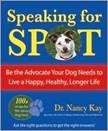Facts About Canine Parvovirus
by Nancy Kay, DVM
 Thanks to all of you who responded to the true/false “Parvovirus Quiz” I recently posted. The lucky winner of an autographed copy of Speaking for Spot is Larry Fosnick Davis from Seattle, Washington.
Thanks to all of you who responded to the true/false “Parvovirus Quiz” I recently posted. The lucky winner of an autographed copy of Speaking for Spot is Larry Fosnick Davis from Seattle, Washington.
Now, here are the answers you’ve been waiting for!
CREDIT:
Dr. Nancy Kay, DVM Diplomate, American College of Veterinary Internal Medicine.
Recipient, American Animal Hospital Association 2009 Animal Welfare and Humane Ethics Award Recipient, 2009 Dog Writers Association of America Award for Best Blog Recipient, 2009 Eukanuba Canine Health Award
 Author of Speaking for Spot: Be the Advocate Your Dog Needs to Live a Happy, Healthy, Longer Life
Author of Speaking for Spot: Be the Advocate Your Dog Needs to Live a Happy, Healthy, Longer Life
Website: http://speakingforspot.com
Spot’s Blog: "http://www.speakingforspot.com/blog
Email: dr.kay@speakingforspot.com
Become a Facebook Fan: Facebook Fan - Nancy-Kay
 Thanks to all of you who responded to the true/false “Parvovirus Quiz” I recently posted. The lucky winner of an autographed copy of Speaking for Spot is Larry Fosnick Davis from Seattle, Washington.
Thanks to all of you who responded to the true/false “Parvovirus Quiz” I recently posted. The lucky winner of an autographed copy of Speaking for Spot is Larry Fosnick Davis from Seattle, Washington.Now, here are the answers you’ve been waiting for!
How did you do? Did you learn anything new?
- Dogs with parvovirus become contagious to other dogs (begin shedding the virus in their feces) at the time diarrhea is first observed.
This is false. Dogs typically become contagious four to seven days before the onset of any symptoms.
- A dog is no longer contagious (stops shedding of parvovirus in their feces) approximately two weeks following infection.
This is true. Keep in mind that this two-week period begins up to one week prior to the onset of symptoms (see question number one above).
- Once parvovirus is shed via feces into the environment, it can remain infectious to other dogs for several months.
This is true. This is the main reason why unvaccinated dogs are so darned susceptible to this disease. Parvovirus organisms are extremely hardy and remain active (infectious) in the environment for up to six months.
- Canine parvovirus can cause heart disease.
This is true. Parvovirus can damage the heart muscle in puppies infected when they are less than six weeks of age. Affected pups die rather quickly from heart failure. This parvovirus induced cardiomyopathy (disease of the heart muscle) is rare, occurring only if the mama dog has no immunity to parvovirus and her pups are exposed to this disease at an early age.
- Adult dogs should be vaccinated against parvovirus disease annually.
This is false. The parvovirus vaccine provides a minimum of three years of protection in previously vaccinated adult dogs. To state this more clearly, if your adult dog receives a parvovirus vaccination every year he or she is being “overvaccinated”. This subjects your dog to all the potential risks associated with the vaccine and absolutely zero benefit. Additionally, you are paying for a vaccine that is completely unnecessary. To learn more about current vaccination protocols I encourage you to read “The Vaccination Conundrum” in Speaking for Spot and Canine Vaccination Guidelines published by the American Animal Hospital Association. If your veterinarian insists on an annual parvovirus vaccination, share the information found in these resources. If this doesn’t solve the problem, it’s time to find a more progressive veterinarian to care for your best buddy. Enough said.
- Some breeds have increased susceptibility to parvovirus disease.
This is true. Rottweilers, Doberman Pinchers, English Springer Spaniels, American Pit Bull Terriers, and German Shepherds have historically been predisposed to parvovirus infection, even when vaccinated according to protocol. This breed predisposition seems to be lessening, thanks to newer vaccines on the market. Nonetheless, with a pup of a more susceptible breed it makes sense to perform parvovirus serology following completion of the puppy vaccine series. This blood test helps confirm that the immune system’s parvovirus-fighting status is up to snuff.
- Canine parvovirus disease causes an elevation in white blood cell count.
This is false. Parvovirus disease typically causes a marked decrease in the white blood cell count. The patient’s recovery typically coincides with recovery of white blood cell numbers.
- Antibiotic therapy is not warranted because parvo is a viral disease.
This is false. Although antibiotics are not effective against viruses, they are an essential component of parvovirus therapy. A low white blood cell count (see question seven above) and severe disruption of the intestinal surfaces render dogs suffering from parvovirus disease very susceptible to bacterial infection. In fact, most parvovirus-associated deaths are caused by secondary bacterial infections.
- The only way a dog who is sick with parvovirus can survive is by receiving round-the-clock care in a veterinary hospital.
This is false. While round-the-clock care is the very best option for treating parvovirus disease, at a cost ranging from $1,500 to $3,000 such therapy is simply not affordable for many people. A recently completed study at Colorado State University’s College of Veterinary Medicine tested an at-home treatment protocol. Therapy consisted of an injection of a long acting antibiotic, a daily injection of an anti-emetic (anti-vomiting medication), and administration of subcutaneous fluids (fluids under the skin) three times daily. At a cost of $200 to $300 this regimen proved to be more affordable and resulted in an 85% survival rate compared to a 90% survival rate with inpatient care. While hospitalization for therapy remains the gold standard, it is nice to know that a viable option exists when cost is prohibitive.
- Unvaccinated dogs are three times more likely to develop parvovirus disease than vaccinated dogs.
This is false. Unvaccinated dogs are 13 times more likely to develop parvovirus disease than vaccinated dogs.
CREDIT:
Dr. Nancy Kay, DVM Diplomate, American College of Veterinary Internal Medicine.
Recipient, American Animal Hospital Association 2009 Animal Welfare and Humane Ethics Award Recipient, 2009 Dog Writers Association of America Award for Best Blog Recipient, 2009 Eukanuba Canine Health Award
 Author of Speaking for Spot: Be the Advocate Your Dog Needs to Live a Happy, Healthy, Longer Life
Author of Speaking for Spot: Be the Advocate Your Dog Needs to Live a Happy, Healthy, Longer LifeWebsite: http://speakingforspot.com
Spot’s Blog: "http://www.speakingforspot.com/blog
Email: dr.kay@speakingforspot.com
Become a Facebook Fan: Facebook Fan - Nancy-Kay
